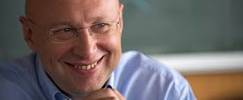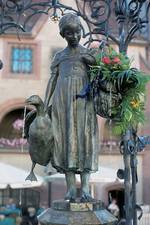According to the famous poet Heinrich Heine, Göttingen's population is divided into four classes: students, faculty, philistines (the bourgeois), and cattle. However, as you will see for yourself, things have significantly improved over these past 200 years.
The first written record of Göttingen dates from 953 AD, when it was a small hamlet, an even smaller and rather insignificant palace of the medieval German emperors, who did not reign from an established capital but would roam from town to town, resolve regional issues, and then move on. After the imperial palace was destroyed in 1180, Göttingen became a semi-important merchant city for over two hundred years, as well as the seat of its own dukedom. However, for some reason the locals never took a liking to castles. In 1387, they burned down the duke's residence and chased him out of town. From then on, the duke of Göttingen ironically had to reign from Hannoversch-Münden, some 20 miles away, and could not even go near the city.
Shortly after the Lutheran reformation swept Germany in the early 1500s, the city switched to the new denomination and joined a league of Lutheran cities. Unfortunately, this turned out to be a bad move: the city lost much of its importance, and what was left went out the window during the Thirty Years' War that ravaged most of Germany in the 1600s. As in many parts of the country, diseases and battles took a heavy toll and turned Göttingen into a sleepy farming town.
Luckily, King George II Augustus of Hanover – also King of England at the time – chose Göttingen as the seat of his territory's university. The newly-founded university finally opened its gates in 1737. Soon, the city's alma mater attracted renowned faculty from all over Germany, and gained the biggest student body of all European universities at the time (more than 800 students!). Göttingen University has played a central role in Germany's academic life ever since, e.g. in establishing the humanities in the academic curriculum, and in particular with regard to modern science. Niels Bohr, Werner Heisenberg, Otto Hahn, Max Born, James Franck, Carl Friedrich Gauss and Friedrich Wöhler were all faculty members. As a result, Göttingen boasts 45 Nobel Prize winners to date who have either taught or studied here – more than any other place in Europe, and second only to the Massachusetts Institute of Technology. Some major political figures also attended the university, among them Otto von Bismarck and the former German chancellor Gerhard Schröder.
After the establishment of the German empire in 1871, Göttingen became a fairly conservative town. When World War I was lost, the Nazis gained a big following very quickly and received a majority of the vote even before they did in other parts of Germany. After they rose to power in 1933, many Jewish or left-wing faculty members were forced to leave the university, a fatal loss from which Göttingen's academia did not recover for a long time. As everywhere, Jews and those opposed to Hitler were heavily persecuted, and the local synagogue was burned down in 1938. The only respect in which Göttingen was lucky: the city was spared from major bombings in World War II.
After the liberation, there were quick efforts to re-establish academic excellence. Max Planck spent his last years in town, and Werner Heisenberg (yes, the man of uncertainty principle fame) took over as president of the local Academy of Sciences. In the 1950s, Göttingen also hosted some of the country's foremost film studios. So if you get to watch a West German movie from that period, you may get a glimpse of the local scenery as it looked back then. In the 1960s and 1970s a number of surrounding villages officially joined the city. Today, the population is about 120,000, roughly a quarter of them university students. The last significant change came with the reunification about a decade ago. Until 1990, Göttingen was located very close to the East German border and thus on the very periphery of West Germany. Since the fall of the wall, many lost connections have been re-established, and today Göttingen is once again one of the most prominent places in the country's heartland.
If you receive a Ph.D. here, do not forget to kiss the "Gänseliesel," the girl statue on the fountain in front of the old city hall – it's the local custom for those who have earned a doctorate. Until very recently, you would have even committed a rebellious act. For some reason nobody can remember, kissing the statue was technically outlawed in 1926. In practice, no one ever cared, and the custom was formally re-legalized in 2001. We hope that you will enjoy your stay, get to love the city and be eager to return once you have to leave. Heinrich Heine once claimed that Göttingen looks most beautiful when you turn your back to it. We hope you will disagree!
Excerpt from MPI for Biophysical Chemistry

